|
Many gamers have been playing computer and video games for longer than they can remember, so it’s sometimes hard to remember what stepping into an entirely new game for the first time feels like. This ongoing series is written with brand new gamers in mind. We’ll be exploring the various aspects of World of Warcraft together—starting from the very beginning. If you’re a new player, this is for you. If you’re an experienced player, you can use these articles as a tool to help friends get into the game for the first time. Get Moving!
The basic movement keys are W, A, S, and D. You’ll find that a lot of games use this layout. Press W to go forward, S to go backward, A to turn left, and D to turn right. It’s not a bad idea to practice leaving the fingers of your left hand on those keys, and your right hand on the mouse. *Lefties! Do you have tips for configuring your setup? Share in the comments!. After you’ve got that down, try getting the mouse involved. Hold down the right mouse button, and you can control where the camera that looks down on your character is pointing. With the right mouse button still held down, press W or the left mouse button to move your character forward. While you’re doing this, you can move your mouse around to turn your character left and right. This is a lot faster than “keyboard turning” using the A and D keys. You can also “strafe” (run sideways) left and right by pressing the A or D key while holding down the right mouse button. You can also move without the keyboard at all by holding down the right mouse button, then pressing the left mouse button to move forward. That’s pretty much all there is to it! Knowing Where to GoNow that you know how to move around, it’s time to learn how to get where you’re going. First, let’s talk about: The Map The first time you access the map, you’ll probably be in an open part of the world. While in larger cities, dungeons, caves, and some other locales, opening the map will show you only your local area. You can also use the drop downs at the top of the map to zoom out and look at other parts of the world. You can close the map by using the M key again, or clicking the X in the upper right corner. You can also use the arrow icon to minimize the map so you have a larger frame of reference than your mini-map can provide. On that note: The Mini-Map The mini-map is a companion to the larger map, but it’s visible all the time on the upper right. Your location is also displayed here as a silver arrow, but the mini-map shows you a much smaller area relative to your position. The name of your immediate location is shown in the title bar at the top—handy if someone asks where you are. An icon that looks like an envelope will appear on the right if you’ve received in-game mail. You can use the + and - symbols to make the mini-map cover a larger or smaller area. The magnifying glass on the left can be clicked to customize what kind of important in-game icons show up on your mini-map. This can be really useful for finding your way around town or locating resource nodes that are important to your Professions. Finally, arrows can appear on the mini-map that point the way toward important objectives, or—if you’ve been unlucky—where your corpse is. *Visit the Game Guide: How To Play Page to see more on the User Interface (UI). Death Isn’t the End
Ready? FIGHT!Battle is a constant fact of life in Azeroth (and beyond), so it’s important to know how to do away with the fearsome foes you’ll encounter in the course of your quests. Targeting To get ready to deal with an enemy, you need to target them first. That’s accomplished by left clicking the foe you wish to fight on the screen. You can also right click them, which will also enable your auto-attack—we’ll cover that in a moment. You can also press the Tab key to cycle through nearby targets. When a creature is targeted, its portrait will appear next to yours on the upper left of the screen. Red names signify hostile creatures, which means they’ll attack if you get too close. Yellow names signify neutral characters, which means they’ll leave you alone unless provoked (though only some can be attacked). Attacking
Your character also has a range of abilities and spells that you must activate to use, which appear on your ActionBar (the long row of icons on the bottom of your screen). These abilities play a very important role in dealing damage, and learning how and when to use them is critical to quickly dispatching your opponents. *Advanced Tip: Once you’ve gotten the hang of your class abilities, it can be worthwhile to visit your respective class forum at www.worldofwarcraft.com to find out more about how to effectively use them from other players. To find out what an ability does, simply hover over its icon with your mouse. To use an ability, press the number key that corresponds to it on your ActionBar, or click it with your mouse. Many players find it effective to key-bind (assign a keyboard key) to hard-to-reach icons, so that all of their important abilities are a quick key-press away. To do so, enter the Game Menu (Escape), and click the Key Bindings option. *Advanced Tip: More advanced players might combine different abilities into special macros, which can allow you to trigger different abilities in sequence or subject to certain conditions. To learn more about how to use your keybindings, macros, and similar user-interface options, you might find it helpful to visit the Interface & Macros forum at www.worldofwarcraft.com. Healing
Ready? GoNow that you know the basics, you’re ready to start your adventure. Be sure to read the other articles in this series to learn more about adventuring in World of Warcraft. You can also join in the discussions on the New Player Help and Guides Forum. |



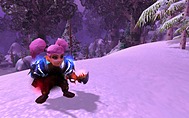 First things first! Before you can enjoy the countless adventures you’ll have in World of Warcraft, you’ve gotta help your character get around in the world. Fortunately, movement is easy, though it can take some getting used to if you’ve never played a first or third-person-perspective game before.
First things first! Before you can enjoy the countless adventures you’ll have in World of Warcraft, you’ve gotta help your character get around in the world. Fortunately, movement is easy, though it can take some getting used to if you’ve never played a first or third-person-perspective game before.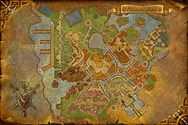
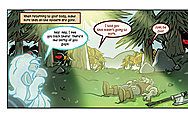
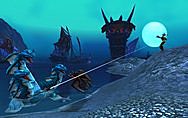 Your character has many different ways of attacking enemies. All characters have an auto-attack, which is the normal melee swing you’ll perform if an enemy is targeted, auto-attack is enabled, and you are in range to swing your weapon. Auto-attack is much more important to fight primarily with weapons, such as
Your character has many different ways of attacking enemies. All characters have an auto-attack, which is the normal melee swing you’ll perform if an enemy is targeted, auto-attack is enabled, and you are in range to swing your weapon. Auto-attack is much more important to fight primarily with weapons, such as 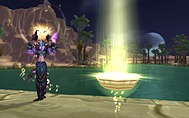 In addition to dealing damage, several character classes in World of Warcraft can heal, restoring health and even resurrecting their injured comrades (signified by a green name hovering over the character). Healing is handled in much the same way as combat, except that instead of targeting a foe, you target allies and party members. Once your ally is targeted, you can trigger the appropriate ability to heal them. If no ally is targeted or you’re targeting a hostile target, then eligible healing spells will be “self-cast,” healing your own character instead. If you want to resurrect a fallen ally, you can target their corpse on the ground, then trigger the appropriate resurrection ability (assuming you’ve earned one).
In addition to dealing damage, several character classes in World of Warcraft can heal, restoring health and even resurrecting their injured comrades (signified by a green name hovering over the character). Healing is handled in much the same way as combat, except that instead of targeting a foe, you target allies and party members. Once your ally is targeted, you can trigger the appropriate ability to heal them. If no ally is targeted or you’re targeting a hostile target, then eligible healing spells will be “self-cast,” healing your own character instead. If you want to resurrect a fallen ally, you can target their corpse on the ground, then trigger the appropriate resurrection ability (assuming you’ve earned one).